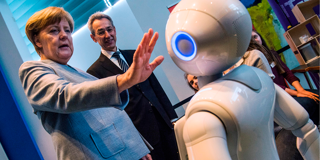Almost every aspect of our economies will be transformed by automation in the coming years. But history and economic theory suggest that fears about technological unemployment, a term coined by John Maynard Keynes nearly a century ago, are misplaced.
BERKELEY – Intelligent machines are transforming the way we produce, work, learn, and live throughout the world. Almost every aspect of our economies will be radically altered.
Major logistics companies and individual drivers are using new technologies to optimize their route planning. Companies like BMW and Tesla have already released self-driving features in their automobiles, which are produced with the help of sophisticated robots. The Associated Press is using artificial intelligence to help write news stories. 3D printers are being used to produce replacement parts – for both machines and humans. AT&T, in collaboration with Udacity, is offering online “nanodegrees” in data analytics. Drones are delivering health supplies to remote locations in poor countries.
These marvelous new technologies promise higher productivity, greater efficiency, and more safety, flexibility, and convenience. But they are also stoking fears about their effects on jobs, skills, and wages. Feeding these fears is a recent study by the University of Oxford’s Carl Frey and Michael Osborne, and another by the McKinsey Global Institute (MGI), which find that large shares of employment in both developing and developed countries could technically be automated. History and economic theory, however, suggest that anxieties about technological unemployment, a term coined by John Maynard Keynes nearly a century ago, are misplaced.

BERKELEY – Intelligent machines are transforming the way we produce, work, learn, and live throughout the world. Almost every aspect of our economies will be radically altered.
Major logistics companies and individual drivers are using new technologies to optimize their route planning. Companies like BMW and Tesla have already released self-driving features in their automobiles, which are produced with the help of sophisticated robots. The Associated Press is using artificial intelligence to help write news stories. 3D printers are being used to produce replacement parts – for both machines and humans. AT&T, in collaboration with Udacity, is offering online “nanodegrees” in data analytics. Drones are delivering health supplies to remote locations in poor countries.
These marvelous new technologies promise higher productivity, greater efficiency, and more safety, flexibility, and convenience. But they are also stoking fears about their effects on jobs, skills, and wages. Feeding these fears is a recent study by the University of Oxford’s Carl Frey and Michael Osborne, and another by the McKinsey Global Institute (MGI), which find that large shares of employment in both developing and developed countries could technically be automated. History and economic theory, however, suggest that anxieties about technological unemployment, a term coined by John Maynard Keynes nearly a century ago, are misplaced.